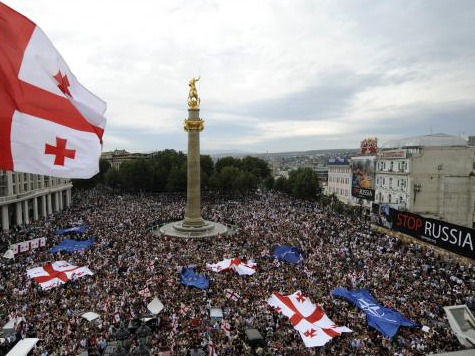
Ex-Soviet states Moldova and Georgia are following Ukraine, another ex-Soviet state, to sign a trade agreement with the European Union on June 27. Russia warned both countries not to proceed with the agreement.
“There is an aggressive attitude from Russia not only towards us but towards any ex-Soviet state which has European aspirations. But this does not mean that we will reject our free choice,” said Georgia’s Head of the Parliamentary Defense and Security Committee Irakly Sesiashvili.
Russia said Georgia does have a right to sign the agreement but must face consequences for its actions. However, Russia never once said how the agreement would affect it and why it matters so much.
“It is Georgia’s sovereign right to sign the Association Agreement with the EU, but it should also understand possible consequences,” Russian Foreign Ministry spokesman Alexander Lukashevich said last month. “Georgia’s sovereign rights should be exercised without damaging the rights of others… It is very important to understand the consequences which the upcoming signing of the Association Agreement between Georgia and the EU on June 27 may have.”
In 2008, Russia invaded Georgia and decided to observe the breakaway regions of Abkhazia and South Ossetia as independent. Georgia fears Russia will annex those regions similarly to how it did Crimea. However, on May 27, protesters stormed into the pro-Russian Abkhazian president’s building and demanded his resignation, and Parliament ousted him on June 1. The presidential elections will be on August 24.
Consequences toward Moldova might be more economic than political. Moldova is the poorest economy in Europe and hopes more trade with Europe will lift its commerce. Moldovan leaders fear Russia might place visa bans on workers from Moldova and extend a ban on Moldovan wines. They also fear Russia might ban other exports, such as fruits and vegetables. Moldova is land-locked, and agriculture is its primary export. At the same time, a close relationship with Europe might help Moldovans enhance their agriculture. Moldova hopes to become a full-time member of the EU, too.
“The signing of the agreement is not the final full-stop in our European aspirations. The next step is even more important – receiving the status of a candidate member of the EU,” said Moldovan Prime Minister Iurie Leanca. “The day after signing we will actively and effectively start working to get this status.”
Moldova also has a breakaway region to worry about, and it might cause more problems for the poor country than Abkhazia and South Ossetia combined caused for Georgia. Transniestra is a small strip of land between Moldova and Ukraine and is home to many ethnic Russians and Russian speakers, just like Crimea. This region is not recognized as independent by any country in the West. Russian Deputy Prime Minister Dmitry Rogozin visited Transniestra on Victory Day only to return to Russia with a petition from the country to join the Russian Federation. On June 7, President Yevgeny Shevchuck told Euronews he wants a “civilized divorce” from Moldova.
In April, the EU decided to give Moldovans visa-free travel, and the proposition even extended to Transniestra.
There is no doubt Moldova and Georgia will face backlash from Russia. Russian President Vladimir Putin used money and gas as bait to force Ukraine’s Russia-backed President Viktor Yanukovych to abandon the EU trade agreement. Pro-West Ukrainians took to the streets for three months before Parliament ousted Yanukovych on February 22. Then Russia invaded and eventually annexed Crimea from Ukraine while state-owned gas company Gazprom started to use gas as a political tool. Pro-Russian forces with the help of Chechens from Russia have taken over regions in east Ukraine.

COMMENTS
Please let us know if you're having issues with commenting.